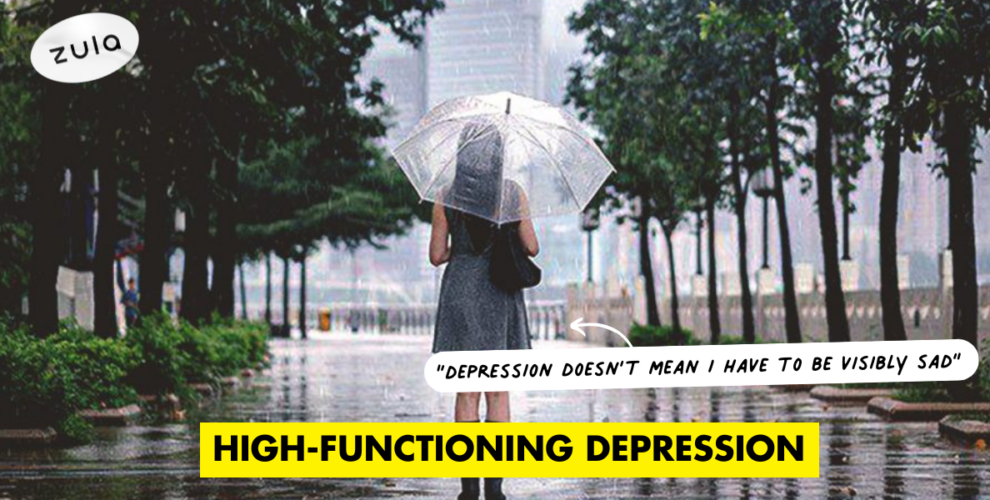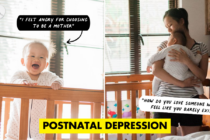High-Functioning Depression
When I was 17, doctors told me I had dysthymic depression and borderline personality disorder. That was 11 years ago.
I still go to therapy, and in the last few years I’ve learnt to manage my mental illness a lot better than I used to. My psychiatrist calls me ‘high-functioning’.
She also says I should be proud of myself for getting this far, and I am. But I don’t think I did it all by myself; I owe a lot to my friends who never lost patience even when I backslid.
It’s vital for people with mental health struggles to have a strong support network. And if I could go back in time, here are things I wish I could have told mine earlier.
Contents
1. Depression doesn’t mean I have to be visibly sad
During a depressive episode, I hardly ever cry in public. Most of the time I don’t ‘look’ depressed–I still do the things I need to do, like clothing and feeding myself.
These things take tremendous effort when I’m in the pit. While I can experience happiness and can go through the motions, there’s always a lingering mass in my chest.
It’s ridiculous that engaging in performative sadness is the only way to be taken seriously.
Please understand that when someone suffering from depressed isn’t visibly sad, it can be even more insidious. They are putting a mask on and that can be even more isolating and painful than expressing their sadness.
2. It can happen to anyone
There’s no truth in the notion that depression only affects people who are weak in character or strength.
Many people with seemingly perfect lives also suffer from mental disorders. Their illnesses aren’t any less serious than those who are struggling more visibly; they’re just better at hiding it.
If anything, mental illness makes one stronger through the willpower to push yourself forward despite the immense desire to give up.
3. I can’t just ‘stop being depressed’
Depression isn’t voluntary. There’s no switch to flip and it can’t just be willed away.
Telling someone to ‘stop being depressed’ is like telling a diabetic person to ‘stop being diabetic’. It makes little sense.
4. Medication is important (for me)
There’s a lot of stigma surrounding psychiatric medications.
Some people can do without them in their treatment plan, but I personally need my medication in conjunction with regular therapy sessions with my psychologist to cope with my symptoms.
Everybody reacts differently to medication; it can make moods worse for some people. But if it works for you, you should stick to your doctor’s treatment plan.
Telling someone who is on psychiatric medications to forgo their pills for aromatherapy or herbal supplements isn’t only disruptive to their healing, but also highly dangerous. If the medication doesn’t work, the best thing to do is to take it up with the prescribing psychiatrist.
Being communicative with your doctor is important, because stopping medications cold turkey can result in withdrawal symptoms like severe depressive episodes and panic attacks.
Also read:
Postnatal Depression: How I Overcame My Mental Health Crisis After It Sent Me To The Emergency Room
5. Don’t dig up past trauma
Some people assume depression only happens after traumatic events, which may or may not be accurate for some people. But even if it is, it’s in poor taste to ask about it.
Triggers are incredibly personal for most people, and if they wanted you to know they would have already told you.
Personally, I like when someone gently lets me know that they don’t require that I tell them my entire history immediately, but they will be happy to listen if I wanted to share. This is a good way to let a friend know that you’re not overlooking their issues while not probing too much.
6. I’m sorry I’m flaky
I probably went through the motions of showering, getting dressed and putting on makeup. I also probably decided I wanted to stay home at the last minute, not because I didn’t want to see you or I couldn’t be bothered.
It’s that my brain gets in the way.
I think about all the people I have to meet, the things I have to say, and I just don’t feel ready. It’s overwhelming, and a deep sense of anxiety prevents me from walking out the door. So, I just end up staying home.
7. Thank you for sticking around
I’m not an exemplary human being—I’ve made terrible mistakes and pushed away those who cared about me.
Sometimes I can’t think clearly when my illness acts up., But most of the time, it’s me not wanting to admit I’m acting out of fear, anger, selfishness, or a combination of the three.
I can’t take back the damage I’ve caused, but I can apologise for all the times I’ve caused hurt. So to the people who’ve stood by me over the years, thank you for loving me even though I wasn’t always perfect.
High-Functioning Depression
By sharing my personal experience, I hope more people can better understand their friends who are in this situation.
And for those who are fighting the good fight, please know you’re not alone.
This article was first published on 22 May 2018 and last updated on 7 February 2024.
Also read:
A Crippling Story Of Depression By A Suicide Survivor In A Mental Institute








